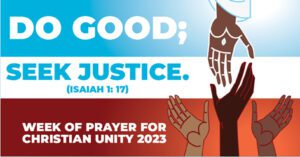
WASHINGTON (OSV News) – James Griffin, executive director of the Durandus Institute for Sacred Music & Liturgy, said the annual Week of Prayer for Christian Unity “was instilled” in him at the parish church of his youth, Our Lady of Atonement Church in San Antonio.
The weeklong Christian ecumenical observance, taking place Jan. 18-25 this year, “is important for all Christians” but has “even greater significance” for Catholics coming from the Anglican tradition, Griffin told OSV News.
Our Lady of Atonement Church in San Antonio was founded in 1983 with the permission of Archbishop Patrick F. Flores. It began with a few converts from the Episcopal Church, a member of the global Anglican Communion. Today Our Lady of the Atonement is part of the Houston-based Ordinariate of the Chair of St. Peter, a Roman Catholic diocese with Anglican traditions established by Pope Benedict XVI in 2012, which includes 40 other Catholic parishes and communities in North America.
One of those parishes, St. Timothy’s Ordinariate Catholic Church in Sykesville, Maryland, will co-sponsor a solemn choral evensong Jan. 25 at the Cathedral of Mary Our Queen in Baltimore, using the Ordinariate form of the Liturgy of the Hours’ evening prayer that reflects their Anglican tradition in full Catholic communion. Father Armando Alejandro, St. Timothy’s parochial administrator, will officiate and Baltimore Archbishop William E. Lori will preach the sermon.
Griffin will be the emcee for the service, which will be dedicated to Pope Benedict XVI, who died Dec. 31 at age 95.
In 2009, Pope Benedict, in response to petitions for Catholic unity from various groups of Anglicans and Episcopalians, created an apostolic constitution, “Anglicanorum coetibus,” which established personal ordinariates – essentially Catholic dioceses where membership is personal rather than territorial – so individuals and parishes could become fully part of the Catholic Church and still live out their Catholic faith through their Anglican patrimony. Pope Francis has confirmed the initiative, by both approving all the ordinariates’ liturgical books, as well as expanding their missionary mandate to include evangelizing the unbaptized, other Christians not yet in full communion, and baptized Catholics who no longer practice the faith.
The Week of Prayer for Christian Unity is a joint effort of the Vatican’s Dicastery for Promoting Christian Unity and the World Council of Churches. It begins on the Jan. 18 feast of the Confession of Peter (“Thou art the Christ, the Son of the Living God” Matthew 16:18). Its final day, Jan. 25, is the feast of the Conversion of Paul.
The 2023 theme is “Do Good; Seek Justice,” taken from the first chapter of Isaiah.
Other events planned around the United States include an afternoon ecumenical service and concert Jan. 18 at the chapel of the Interchurch Center in New York, hosted by the Graymoor Ecumenical & Interreligious Institute.
In California, for the 17th year, Archbishop Salvatore J. Cordileone of San Francisco and Greek Orthodox Metropolitan Gerasimos will lead solemn vespers together Jan. 23 at St. Pius X Catholic Church in Redwood City, California.
The Ecumenical Institute for Ministry in New Mexico has organized a pilgrimage for the Week of Prayer for Christian Unity for participants from “diverse Christian traditions” to “heal and build up the body of Christ … as they walk, talk, worship, pray, and sing and listen together.” People also can participate virtually in a self-directed pilgrimage.
The Week of Prayer for Christian Unity began as the Church Unity Octave. It was celebrated for the first time Jan. 18-25, 1908, by Father Paul Wattson and Mother Lurana White, Episcopal co-founders of the Society of the Atonement, at Graymoor, the headquarters of the Franciscan Friars and Sisters of the Atonement in Garrison, New York.
A year later, the friars, the sisters and 13 of their lay associates were received into full communion with the Catholic Church. The Atonement priests, sisters and brothers work for reconciliation and healing through the unity of men and women with God and one another, in fulfillment of the mandate from Jesus Christ’s prayer to God the Father in the Gospel of St. John: “that they all may be one.”
Father Wattson, who is a candidate for sainthood, had high hopes that the entire Anglican Communion would be “reincorporated with Rome,” said Griffin, who was raised by an Episcopal father and a Seventh-day Adventist mother. He became a Catholic in 2005 when he was 18.
“Many of those hopes have not been realized, not in our lifetime, but we see other Christian churches pray for Christian unity. … Most Christians realize our divisions between each other are not the way God intended for us to operate,” Griffin told OSV News.
Each year, in advance of the Week of Prayer, an international committee co-sponsored by the Vatican and the World Council of Churches invites a local ecumenical group to propose a scriptural theme.
The year’s theme was selected by the Minnesota Council of Churches in the aftermath of the May 25, 2020, death of George Floyd in Minneapolis while in police custody and the trial of the police officer responsible for his death.
“The entire scriptural passage for the theme is Isaiah 1:12-18, lamenting a lack of justice among the people of God. Yet, it also promises redemption by encouraging acts of justice,” said Father James Loughran, a Franciscan Friar of the Atonement, who is director of the Graymoor Ecumenical & Interreligious Institute. He made the comment in a post on the institute’s website.
Father James Gardiner, another Atonement friar who has long been involved in ecumenical and interfaith efforts, told OSV News this year’s theme for the week “couldn’t be more timely.”
“Given the news each day,” he said, “the theme offers enormous possibilities for praying and preaching.”
